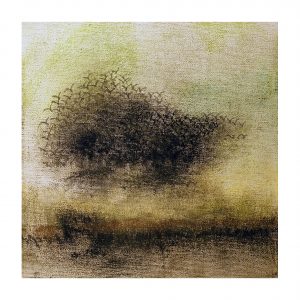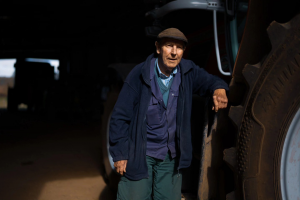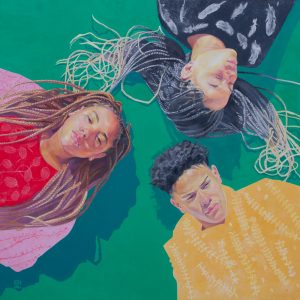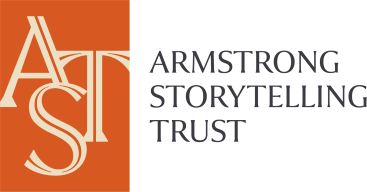Liz Weir
Storyteller
From Belfast libraries to Guinness World Records and global awards – Liz shows how stories, shared with care, can enchant, connect, and heal across cultures, ages, and unexpected places.

“When Covid came, I was stuck up here on top of the mountain. Nobody here. So I started doing it online, and we had up to 80 people coming every Saturday night. Now we’re down to about 20, but they’re still there from Ohio and San Diego and Prague and Scotland and Derry and all over the place.”
What began as a necessity became proof that storytelling could thrive in virtual spaces. “People say you can’t build community online… We have a really strong storytelling community online, you know, which pleases me. There are people in their 90s… come on every Saturday night. So amazing. Just amazing. I really believe if you build it, they will come.”
Choosing the Right Story
“For me, being a good storyteller isn’t just about being able to tell stories. It’s about choosing the right story for the right audience at the right time. Am I in a church group, in the pub on Saturday night, in school, in a library? There has to be a really good match.”
That philosophy has shaped her fifty-year career, where she has built a vast repertoire drawn from folklore, nursing homes, and the stories passed down through generations. “It’s a life’s work building up stories… I go into nursing homes and older people tell me stories. It’s just lovely to bring those people out in front of an audience.”
Stories of Magic, Love, and Folklore
Weir delights in stories of enchantment and superstition. “Last Saturday night, I told one of my favorite stories, which is a story from Rathlin Island, from the telling of the late Thomas Cecil. There’s a story about a boy who gets taken by the fairies, but they bring him back because he’s got a thorn trapped under his finger.”
“I like stories of magic and enchantment. I like stories about love. Stories from folklore really, cures and superstitions, magical pieces and ghost stories.”
From Queen’s to the World
Her path began in Belfast. “I did an English degree at Queen’s, and I did a post-grad in librarianship… I was set my first task of telling the story at Falls Road Library, Belfast. And I had the book, and the book was shaking and I was shaking because I’m actually a really shy person. But the kids liked it – that made me feel good about myself.” She had expected librarianship to be about books alone, not performance. Yet that first shaky telling opened a door: “I thought it was all just books, you know? But the audience gives you confidence.” Over time she grew into the role, shedding the book as a barrier between herself and her listeners and learning, as she says, “to tell stories out of my mouth with no book between me and them.”
The shy librarian became an international storyteller. “That was 1973. That’s a long time… 50 years probably.”
Storytelling for Understanding
Stories are not only entertainment but tools for empathy. “Part of my philosophy as a storyteller is… to have stories that make people think. If I’m doing anti-bullying work in a school, you do stories of friendship. Nowadays, what’s very relevant in Northern Ireland is multicultural work… we’re collecting stories from Syrian women now living in Belfast, publishing a collection of their stories in English and in Arabic, so that people will gain a greater understanding.”
Weir’s current role as storyteller-in-residence for the Armstrong Storytelling Trust reflects this mission. “I think stories can promote conflict resolution, promote understanding.”
Stories Without Borders
Her travels have taken her across five continents. “Years ago I went to Israel to tell stories and we had Arab, Bedouin, Druze, Palestinian, Israeli storytellers all together doing the storytelling for peace.”
In Marrakesh, she joined more than 100 storytellers for the International Storytelling Festival. “We decided to go for the Guinness Book of World Records… 80 hours of storytelling… storytellers telling in over 40 languages. That’s really special.”
She recalls sitting in a tent at 4:00 in the morning surrounded by Moroccan storytellers, keeping the audience awake. “This time Guinness insisted you had ten people all awake listening at any one time… it was a very interesting trip.”
Ballyeamon Barn and the Yarn Spinners
Closer to home, Weir has created hubs for stories. “Every Saturday is Ballyeamon Barn. I have a hostel here in the Glens of Antrim. We do performances and workshops… If we’ve got visitors here we do it live, a hybrid. Some people on the big screen and some people present in person.”
Her long-standing project, The Yarn Spinners, has grown from a dream into a movement. “We started off with one storytelling session, which is still going after 33 years… now we do monthly sessions in Tullycarnet, Lisburn City Library, Bangor Library as well. And there’s lots of new sessions in Tyrone, Armagh, Fermanagh, Cork, Kilkenny, and Derry. So my dream’s pretty much come to fruition.”

Collaborations and Creativity
For Weir, collaboration is essential. “Last month we were up in Portstewart in Agherton Church, doing this new piece that we’re performing at the Seamus Heaney Homeplace, called A Cloak of Wisdom. That’s Women’s Stories Reimagined, where I’m collaborating with Anne Harper, who plays harp and clarinet. We got funding from the Arts Council to perform, and we’re touring that around at the minute, including The Duncairn in October.”
Weir has also co-authored 15 books with illustrator Corrina Askin for the Education Authority, placing them in every school in Northern Ireland. “It’s just lovely to collaborate with somebody as talented as her.”
Technology and the Future of Storytelling
Covid expanded storytelling’s reach. “During Covid, we got to hear the best storytellers in the world online… From an Irish perspective, it’s brought Irish storytelling all around the world.”
Hybrid models continue to thrive. “I do concerts in America online… people pay to watch a storytelling concert. It’s great for storytellers and great for audiences.”
Weir celebrates innovation: “Corrina’s working at the minute with Vicky McFarland, a great storyteller. She’s got a geodesic dome… she tells the stories, the kids are watching Corrina’s animation… real sensory storytelling. So again, storytelling is very much part of the future.”
Recognition and Legacy
Despite setbacks – including a recent injury – Weir continues to be celebrated. One of her proudest moments came in as part of her time in Marrakesh – while recovering from her accident, she was honoured with the Sharjah International Award for Cultural Heritage in Best Narrators and Heritage Bearers (Living Human Treasures). Unable to travel, her friend Sahar accepted the award on her behalf in the United Arab Emirates. “While I was in the hospital, I got this award for my services to storytelling… It was lovely to be acknowledged for your work in different countries.”
As she looks to the future, she keeps returning to the same truth: storytelling is not just for children. “My very first session that I organized at the Folk Museum in Cultra in the 80s, called Yarn Spinning: Who Says Storytelling is Just for Kids? – we had over 100 people turned up. And I think we’ve made the point really well. Now storytelling is for all age groups.”
The Armstrong Storytelling Trust remains central to her work, alongside her open house at Ballyeamon Barn, which continues to welcome storytellers from around the world. “I think storytelling can promote understanding really well… It’s not always about talking. You need to be a good listener. If you listen to another person’s story, even though you diametrically oppose it, you’re paying them respect. Listening is as important as talking.”
Liz is the Storyteller in Residence for the Armstrong Storytelling Trust: armstory.org.uk
Find out more about The Ballyeamon Barn Hostel via their website: ballyeamonbarn.com
Keep up with Liz on social media: @lizstoryteller
The Latest Articles

Inni-K on Still A Day: Genuine Irish Songwriting
In the aftermath of touring Still A Day, the singer, composer, and multi-instrumentalist considers music, nature, and what remains once the movement stops.

Bob Speers and the Quiet Magic of Ireland’s Bogs
In a room filled with timber, peat, and light, artworks hung on walls are more like fragments of the land itself – weathered, breathing, and alive with memory.

Hernan Farias on Light, Connection and Creative Growth
From the Classroom to the Camera – charting his shift from teaching English in Chile to full-time photography in Northern Ireland.

The Colour & Spirit of Time: Tricia Kelly’s Journey with Ócar
Exploring how sixty million years of volcanic fire, weather, and transformation created the red ochre that now colours Tricia’s life and work.

Faith and Colour: The Genuine Art of Beverley Healy
In her imaginative work, paint becomes prayer – a meditation on trust, surrender, and creation, where colour and stillness meet to form something transcendent.

Ruairi Mooney on Creativity, Practice & the Search for Authentic Art
From the North Coast to the Canvas: a journey of resilience, daily practice, and the slow discovery of an authentic artistic voice.

